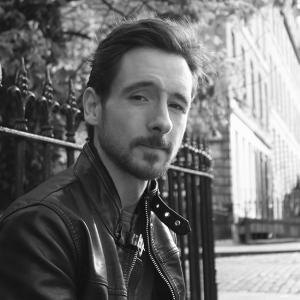I'm Matt Gemmell, and I'm a writer and novelist. I'm Scottish, and I live in the city of Edinburgh with my wife Lauren.
Previously, I was a consultant software developer and user experience designer, mostly for the Apple platforms (iOS and OS X).
How did you get start writing? What is your background?
I've been writing since I was a child. Ever since I started reading, I've wanted to create stories – and I began to do so by my early teenage years. I have box files of short fiction from that time in my life, and I've been writing on and off since then.
I regularly publish articles on my moderately popular blog at mattgemmell.com, which is read by over a million people each year. I've been writing there for more than twelve years.
My professional background and my degree are in Computing Science, a field which I abandoned at the end of 2013 to focus fully on my writing. During my years as a consultant software engineer, I worked for various Fortune 500 companies including Apple, spoke at conferences all over the world, and released many open source projects which have been used in thousands of apps.
What are you working on now?
My first self-published novel, Changer, will be available this year. It's an adventure thriller, and the beginning of a series. I'll also be writing separate novels in the horror fiction genre, publishing those books alongside the series.
I periodically write technology-focused pieces for magazines and newspapers, particularly regarding the Mac and iPhone/iPad. I've had pieces in Macworld, MacUser, MacLife, Tap!, The Guardian, and more. I also write opinion pieces for magazines like The Loop Magazine, and Offscreen.
My book of essays on Amazon.
What software do you use for your work?
For my long-form fiction, I use Scrivener. It's invaluable for writing, editing, and organising novel-length projects. I spent most of the day with it.
For my commissioned pieces for magazines, articles for my site, and miscellaneous text editing, I've always used BBEdit. I've been using it since I was in high school, and I couldn't be without it at this point.
I prefer to use separate, dedicated apps for task/project management, and for outlining and restructuring lengthy pieces: I use OmniFocus and OmniOutliner respectively. They're powerful, well-designed tools for professionals who want to take control of their work, and I use each app on both my Macs and my iPhone (and my Apple Watch, for OmniFocus).
Most of the other apps I use are the standard Apple-supplied productivity applications, but I do also use SelfControl to temporarily block my access to the various social media, shopping, news etc sites, to help me focus on my work.
And what hardware?
I have a 27" iMac with an external display and an Intuos 5 graphics tablet, but my primary work machine these days is an 11" MacBook Air. I'm at my most productive when I'm using just the MacBook. The constrained screen space lets me immerse myself in the words, without distractions. I'll be getting rid of the desktop Mac later this year.
An important part of my work setup is a selection of paper notebooks, pens, and the whiteboard attached to the rear wall of my home office. I find that planning and brainstorming away from the computers is more conducive to creativity.
What is your ideal work environment?
I have my own dedicated office at home, where I work full-time. It has a wrap-around desk, my guitar, two windows looking out into the park, and it's a very calm and quiet space.
I periodically take my MacBook Air and walk along the riverbank to a nearby coffee shop, to spend a couple of hours working there, or just relocate to an armchair in our own living room. I'm fortunate to be able to work almost anywhere.
Who are the creatives you admire most?
I've always been a fan of Stephen King, not just for the genre but primarily for his talent in characterisation. His characters just effortlessly live and breathe, and the main hook of his work is how we get to see very real people reacting to the extraordinary, usually with the horror coming from the people instead of anything supernatural. The voice of his writing has always been a strong one in my mind.
I admire anyone who can tell a compelling story, because getting the reader to turn the page is always the ultimate goal. Dean Koontz, Clive Cussler, Michael Crichton, Iain Banks, James Rollins, Scott Mariani, and many more are all regular fixtures on my Kindle.
I'm thrilled at how many new authors are self-publishing digitally; there's some wonderful stuff out there. I discover new, compelling voices every month. It's a great time to be a writer, and a reader.
